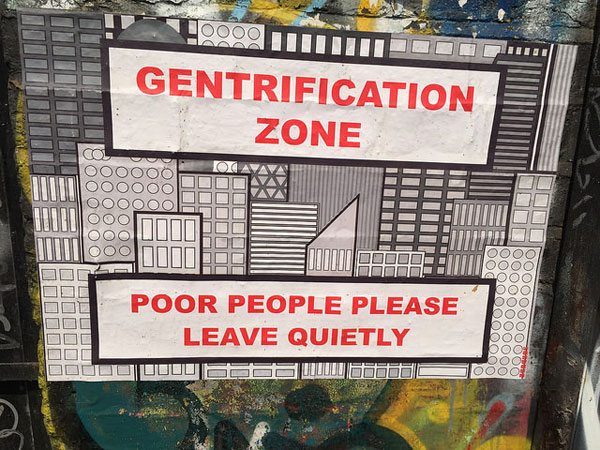
March 28, 2018; Shelterforce
If you studied economics, you may have heard that rent control harms renters. And yet, in a growing number of cities, tenants are advocating for controls. Are they crazy? Or, is the story more complicated than economics textbooks suggest? Writing in Shelterforce, a housing and community development journal, tenant advocates Dean Preston and Shanti Singh make the case that there is more to the housing market than meets the neoclassical eye.
It may be helpful to recall why rent control is, in the standard account, not supposed to work. Simply put, by controlling prices, the expected earnings of landlords fall. Over time, this is said to reduce construction, lower maintenance spending, and even reduce existing supply as some landlords convert buildings from rental to condos. Of course, if the supply of rental units falls or stays even and demand rises…well, then the price of housing should rise.
It sounds so obvious…except that it is not. In economics, the core neoclassical assumptions vary greatly from what we see. A well-functioning market requires “perfect information,” but anyone who has ever looked for a place to live knows that real estate is riven with uncertainty. A well-functioning market also requires perfect competition, which, due to barriers to entry, doesn’t characterize real estate either. It is hard for tenants to organize and become their own landlords, which doesn’t stop housing cooperatives from being a good idea.
Given the power differential between landlords and tenants, absent regulation, exploitation of tenants, particularly those with low incomes, is likely. In Portland, Oregon, where state law bans rent control, the city passed a law that said landlords can raise rents as they wish, but if the rent goes up by more than 10 percent and a tenant has to move, the landlord must pay the tenant’s moving expenses. Part of what drove public support for that law were landlords who doubled rents overnight, forcing families to move and spurring mass protests.
A paper published last fall by Stanford professors Rebecca Diamond, Tim McQuade, and Franklin Qian, The Effects of Rent Control Expansion on Tenants, Landlords and Inequality: Evidence from San Francisco, purports to show that rent control in San Francisco has contributed to gentrification. Contributed, perhaps, but it seems clear that the tech boom, not rent control, has had the larger influence. One sign of this is that tech-centered cities like Portland and Seattle that lack rent control aren’t free from gentrification.
Preston and Singh also highlight a 2014 MIT study which finds that, “When rent control was eliminated in Massachusetts, costs of all housing in Cambridge, formerly rent controlled and uncontrolled units, rose dramatically.” And, as Jake Blumgart wrote in 2015, in nearby Boston, “Census data shows that Boston’s vacancy rate was four percent before the regulations were phased out and 2.9 percent four years after they were done away with—scrapping rent control had, at the very least, not generated a measurable effect on apartment availability. The median price for a two-bedroom apartment doubled in the meantime.”
Sign up for our free newsletters
Subscribe to NPQ's newsletters to have our top stories delivered directly to your inbox.
By signing up, you agree to our privacy policy and terms of use, and to receive messages from NPQ and our partners.
Interestingly, Preston and Singh note, despite the Stanford authors’ opposition to rent control, some of their data “makes a compelling case for the effectiveness of rent control in…[helping] prevent the displacement of working-class tenants, seniors, immigrants, and communities of color from hot urban real estate markets.” According to Diamond and her colleagues, “rent control increased the probability a renter stayed at their address by close to 20 percent,” with benefits most pronounced “among older households and among households that have already spent a number of years at their treated address.”
“In other words,” write Preston and Singh, “seniors and long-term tenants find longer-term stability because of rent control.”
Joshua Mason, an economics professor at John Jay College, makes a similar point:
The real goal of rent control is protecting the moral rights of occupancy.…If we think that income diverse, stable neighborhoods, where people are not forced to move every few years, [are worth preserving] then we collectively have an interest in stabilizing the neighborhood.
Rent control takes many forms. Most promote tenant security while permitting landlords to earn a “fair” or “reasonable” return, as economist Richard Arnott has put it. It has been noted that in New York City, the two biggest construction booms occurred during periods of tight rent controls, suggesting that the supply-dampening effects of rent controls may be overstated. Indeed, a number of studies suggest holes in the standard account.
Still, rent control only works if linked to a strategy that increases affordable housing supply. At NPQ, we have covered some of these strategies, such as community land trusts. As for Preston and Singh, they cite the work of Berkeley Center for Community Innovation director Miriam Zuk and professor Karen Chapple, who call for an approach that combines new affordable housing with protections for existing tenants. “In overheated markets like San Francisco,” Zuk and Chapple write, “addressing the displacement crisis will require aggressive preservation strategies in addition to the development of subsidized and market-rate housing, as building alone won’t protect specific vulnerable neighborhoods and households.”—Steve Dubb













